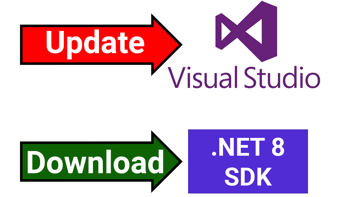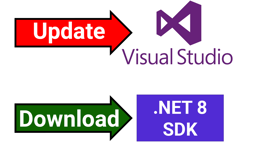- Home
- .NET tutorials
- Hosted service has a major update to its lifecycle events
Hosted service has a major update to its lifecycle events
Published: Tuesday 12 December 2023
A worker service project has seen a major update in .NET 8 with the ability to hook into more lifecycle events for a hosted service.
Creating a worker service project
When creating a worker service project, it typically creates a background service which is similar to this:
public class Worker : BackgroundService
{
private readonly ILogger<Worker> _logger;
public Worker(ILogger<Worker> logger)
{
_logger = logger;
}
protected override async Task ExecuteAsync(CancellationToken stoppingToken)
{
while (!stoppingToken.IsCancellationRequested)
{
if (_logger.IsEnabled(LogLevel.Information))
{
_logger.LogInformation("Worker running at: {time}", DateTimeOffset.Now);
}
await Task.Delay(5000, stoppingToken);
}
}
}This service inherits the BackgroundService abstract class which includes an abstract ExecuteAsync method that we have to override.
ExecuteAsync method requires a cancellation token in the parameter which we typically would use in a while loop whilst the cancellation has not been requested.
The IHostedService interface
The BackgroundService abstract class implements the IHostedService interface which includes methods for when a hosted service starts and stops.
/// <summary>
/// Defines methods for objects that are managed by the host.
/// </summary>
public interface IHostedService
{
/// <summary>
/// Triggered when the application host is ready to start the service.
/// </summary>
/// <param name="cancellationToken">Indicates that the start process has been aborted.</param>
/// <returns>A <see cref="Task"/> that represents the asynchronous Start operation.</returns>
Task StartAsync(CancellationToken cancellationToken);
/// <summary>
/// Triggered when the application host is performing a graceful shutdown.
/// </summary>
/// <param name="cancellationToken">Indicates that the shutdown process should no longer be graceful.</param>
/// <returns>A <see cref="Task"/> that represents the asynchronous Stop operation.</returns>
Task StopAsync(CancellationToken cancellationToken);
}This is better than nothing, but it doesn't give us many lifecycle events and therefore flexibility on what we can do.
Introducing the new IHostedLifecycleService
New for .NET 8, the IHostedLifecycleService interface makes its appearence. This implements the IHostedService interface so includes the StartAsync and StopAsync implementations.
StartingAsync- Invoked before theStartAsyncmethodStartedAsync- Invoked after theStartAsyncmethodStoppingAsync- Invoked before theStopAsyncmethodStoppedAsync- Invoked after theStopAsyncmethod
This is great as we can use these new methods for our worker service such as importing or exporting data and validation.
The problem with BackgroundService
The problem with the existing BackgroundService abstract class is that it implements the IHostedService interface, so only takes advantage of the StartAsync and StopAsync methods.
Adding the IHostedLifecycleService to an existing background service
The answer is to implement the IHostedLifecycleService to the existing background service and implementing the new methods into it.
public class Worker : BackgroundService, IHostedLifecycleService
{
private readonly ILogger<Worker> _logger;
public Worker(ILogger<Worker> logger)
{
_logger = logger;
}
public Task StartingAsync(CancellationToken cancellationToken)
{
_logger.LogInformation("** Starting **");
return Task.CompletedTask;
}
public override Task StartAsync(CancellationToken cancellationToken)
{
_logger.LogInformation("** Start **");
return base.StartAsync(cancellationToken);
}
public Task StartedAsync(CancellationToken cancellationToken)
{
_logger.LogInformation("** Started **");
return Task.CompletedTask;
}
public Task StoppingAsync(CancellationToken cancellationToken)
{
_logger.LogInformation("** Stopping **");
return Task.CompletedTask;
}
public override Task StopAsync(CancellationToken cancellationToken)
{
_logger.LogInformation("** Stop **");
return base.StopAsync(cancellationToken);
}
public Task StoppedAsync(CancellationToken cancellationToken)
{
_logger.LogInformation("** Stopped **");
return Task.CompletedTask;
}
protected override async Task ExecuteAsync(
CancellationToken cancellationToken)
{
while (!cancellationToken.IsCancellationRequested)
{
if (_logger.IsEnabled(LogLevel.Information))
{
_logger.LogInformation(
"Worker running at: {time}",
DateTimeOffset.Now
);
}
await Task.Delay(5000, cancellationToken);
}
}
}Watch the new lifecycle events in action
Watch our video where we talk through the changes to the hosted service in .NET 8 and demo them to ensure that we can successfully hook into the new lifecycle events and confirm the order in which the events are triggered.
Related pages

How to download and install the .NET 8 and C# 12 release
.NET 8 and C# 12 have been released and we'll show you how to update Visual Studio and download the .NET 8 SDK.

